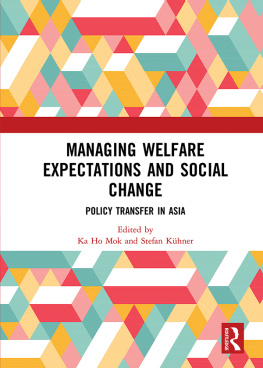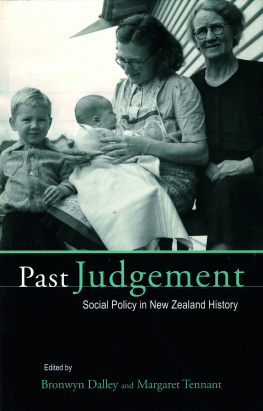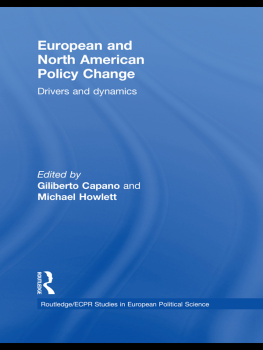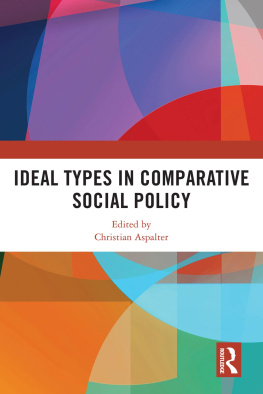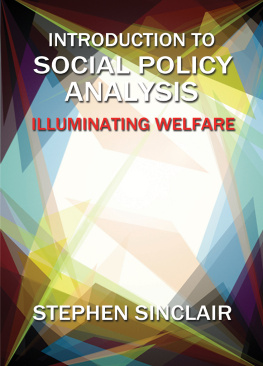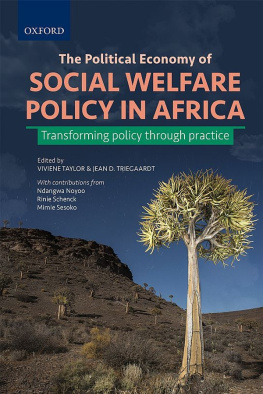A Policy Travelogue
A POLICY TRAVELOGUE
Tracing Welfare Reform in Aotearoa/New Zealand and Canada
Catherine Kingfisher

Published in 2013 by
Berghahn Books
www.berghahnbooks.com
2013, 2016 Catherine Kingfisher
First paperback edition published in 2016
All rights reserved. Except for the quotation of short passages for the purposes of criticism and review, no part of this book may be reproduced in any form or by any means, electronic or mechanical, including photocopying, recording, or any information storage and retrieval system now known or to be invented, without written permission of the publisher.
Library of Congress Cataloging-in-Publication Data
Kingfisher, Catherine Plissier.
A policy travelogue : tracing welfare reform in Aotearoa/New Zealand and Canada / Catherine Kingfisher.
pages cm
Includes bibliographical references and index.
ISBN 978-1-78238-005-4 (hardback) ISBN 978-1-78533-221-0 (paperback) ISBN 978-1-78238-006-1 (ebook)
1. Public welfareNew Zealand. 2. Public welfareAlberta. 3. Social serviceNew Zealand. 4. Social serviceAlberta. 5. New ZealandSocial policy. 6. AlbertaSocial policy. I. Title.
HV515.5.K56 2013
362.5568097123dc23
2013005574
British Library Cataloguing in Publication Data
A catalogue record for this book is available from the British Library
ISBN 978-1-78238-005-4 hardback
ISBN 978-1-78533-221-0 paperback
ISBN 978-1-78238-006-1 ebook
En hommage ma mre, Emma Loubire Plissier, dont la joie de vivre, lhumour, la bont, et lamour ont embelli notre monde.
ACKNOWLEDGMENTS
This book would not have been possible without the poor single mothers, community service providers, and welfare workers who so generously shared their experiences and thoughts with me. I was both amazed and humbled by their indulgent responses to my snooping presence and endless questions, especially in light of the time and resource limitations from which they suffer. Gatekeepers to the welfare system and to various community service agencies, as well as several politicians and official policy makers in Aotearoa/New Zealand, were also crucial to the success of this project. I am grateful for their willingness to provide access to their organizations and for their insights into the policy process.
The productive criticism of colleagues has been equally essential. I am especially indebted to Jeff Maskovsky and A. R. Vasavi for their comprehensive, considered, and gently demanding feedback. In addition, I thank Janine Brodie, Norman Buchignani, John Clarke, Alvin Finkel, Richard Freeman, Michael Goldsmith, Judith Goode, Lois Harder, Trevor Harrison, Doreen Indra, Wendy Larner, Claudia Malacrida, Sybille Manneschmidt, Sandi Morgen, Maria Ng, Melanie Nolan, Jamie Peck, Cris Shore, Rachel Simon-Kumar, Alan Smart, Marilyn Strathern, Carol Williams, and Patrick Wilson for the many ways in which they enriched aspects of my thinking and writing. I thank Allison Dobek, Catherine Gannon, Michael McCarthy, and Cindy Venhuis for their superb research assistance; and Paul Klein and Jenny Oseen for their outstanding editorial contributions. At Berghahn Books, I am grateful to Ann Przyzycki DeVita, Adam Capitanio, Elizabeth Berg, Melissa Spinelli, and other members of the production team for their timely and professional work.
In Aotearoa/New Zealand, Michael Goldsmith and Beryl Fletcher kindly hosted me in 2004 and 2005. We joked about their basement suite (a.k.a., the pit of despair) but I am eternally grateful to them for putting it at my disposal, and for their excellent company. Other friends and family, including Andrea Cullar, Dagmar Dahle, Priya Kurian, John Plissier, Bernadette Plissier, Marguerite Plissier, Jacqueline Preyde, Denise van Schothorst, Laura Lee Slayton, Michael Stingl, and, above all, Levi Kingfisher, gave me much-needed encouragement.
Finally, I thank Karen Campbell, whose fine artwork, elegantly depicting fields of shift and change, graces the cover of this book.
Funds for this research were generously provided by the Wenner-Gren Foundation for Anthropological Research, the Social Science and Humanities Research Council of Canada, and the University of Lethbridge Research Fund.
Introduction
TRACING POLICY
Translation and Assemblage

This book explores the social life of policy. According to mainstream policy science, social policy is produced by policy experts on the basis of rational, scientific knowledge. Some of this knowledge is locally produced, and some of it is drawn from elsewhere, where similarly situated policy experts have worked to deal with related problems. Once developed, policy is implemented by policy providers, who operate as conduits for its administration in institutions designed to serve and manage various populations and their problems. Finally, social policy is received by the targets of policy, whose lives are accordingly altered for the better.
This story about social policy serves to produce and support modernist interpretations of governance that extend the metaphor of body as machine to minds and personalities as well as to society; that cover up the messiness of official policy production; that fail to take into account the reality that all those who engage with social policynot only policy elites, but also providers and recipientsare active and knowledgeable insiders who in fact make and transform policy in their interactions with it; and, finally, that fall short of providing an adequate accounting of the realities and nuances of power as it is embedded in policy, always engaged with and sometimes thwarted by the range of actors who encounter it.
Initially, anthropologists were at least partially aligned with this mainstream story, certainly with regard to official policy production. When policy studies emerged as an academic and practical enterprise in the mid-twentieth century, US political scientist Harold Lasswell (1951: 3) underscored the intelligence needs of policy, that is, the need to improve the concrete content of the information and the interpretations available to policy makers. In response to this call, and in a volume co-edited by Lasswell, anthropologists Margaret Mead (1951) and Clyde Kluckhohn (1951) argued that policy makers needed to understand culture in order to make good policy: both Culture (with a big C) as a feature of the human species, and culture (with a little c) as the specific parameters of practice and meaning-making characteristic of particular groups. As an argument against abstractionarmchair policy making, as it wereand in favor of policy making based on concrete, situated knowledges of cultural and social realities, this provided a useful intervention, an early instance of applied anthropology.
This intervention has not gone out of date. Indeed, contemporary practices of fast policy transfer (Peck 2002; Peck and Theodore 2001, 2010) fly in the face of this insight by framing policies developed in one location as applicable to all locations, engaging in precisely the kind of acultural universalizing that Mead and Kluckhohn challenged. However, while recent interpretive approaches to policy, emerging in political science as well as in anthropology (Belshaw 1976; Fischer 2003; Shore and Wright 1997, 2011; Shore, Wright, and Per 2011; Wedel et al. 2005), have continued to build on Meads and Kluckhohns contributions, they have also turned them on their head to argue that culture does not just have an impact on how policies play out, but also the reverse: that policy is one of the key mechanisms by which we do culture. In this reading, while it may be the case that we need to understand culture in order to make good policy, it is also the case that we need to understand policy in order to understand culture. Policy as a mechanism for social engineering is thus itself an artifact of the social, giving lie to the belief that there exists an outside-of-culture space of social scientific rationality.
Next page

